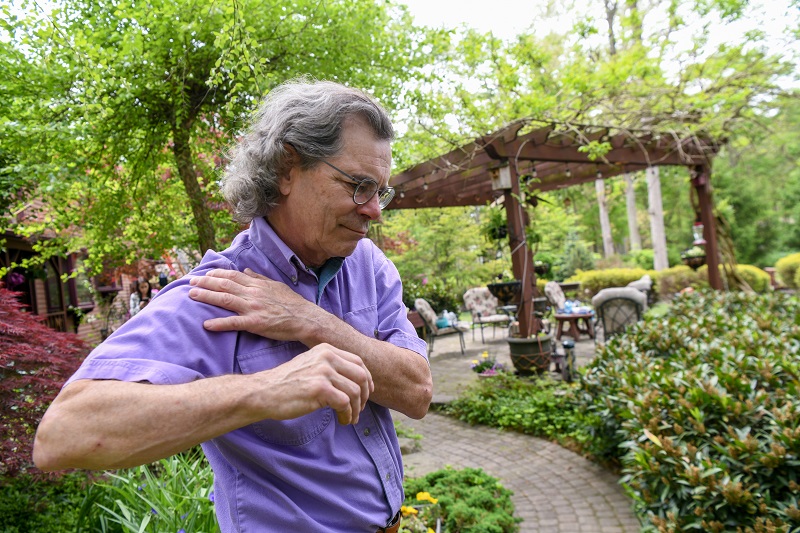Can You Heal a Torn Rotator Cuff Naturally?

May 30, 2023
If you have pain in your shoulder or you can’t move your arm very well, a rotator cuff tear or strain might be the culprit.
The shoulder is made up of a ball and socket that moves around, allowing a wide range of motion. In order to keep that joint from sliding out of place, a group of four muscles and tendons form a cuff around the ball to help initiate range of motion and provide dynamic stabilization.
But what happens when these muscles are strained or torn? Will they heal on their own?
How Does a Tear Occur?
“A rotator cuff tear occurs when one or more of these small muscles tear off of their attachment sites,” says Rocco Bassora, M.D., an orthopedic surgeon at Hackensack University Medical Center. A tear can happen in one of two ways:
- Acute sudden tear: This may occur when you fall or after a sudden expected motion when trying to lift something heavy.
- Chronic tear: This occurs slowly over time, especially if you have chronic tendinitis, or a partial tear.
How Do Tears Heal?
“From my experience, rotator cuff tears don’t tend to heal on their own,” Dr. Bassora says. “However, most patients can live with a partial tear.”
Just because you have a torn rotator cuff doesn’t mean surgery is the only solution. Dr. Bassora says there are several steps to try to reduce pain and inflammation, including:
- Activity modification: Allowing the shoulder to rest and recover can help reduce pain.
- Over-the-counter anti-inflammatories: While Dr. Bassora isn’t a big proponent of taking pills, pain management is important particularly at night in order to sleep.
- Home exercise program: This can help stretch and strengthen surrounding muscles.
- Physical therapy: If home exercises don’t seem to be helping, time with a physical therapist can help safely strengthen the muscles around the shoulder to relieve the burden on your rotator cuff muscles.
- Cortisone injections: This helps diminish the inflammatory response and provide pain relief.
- Surgery: Surgery is usually a last resort if people do not see improvement with other methods.
Who Needs Surgery?
“If other measures are unsuccessful and you continue to have pain and weakness, surgery may be needed,” Dr. Bassora says. “Additionally, people with full thickness tears—when the tendon is completely detached from bone—need surgery. These only get worse with time and need more aggressive treatment.”
The surgery to repair a rotator cuff tear takes only about an hour and can be done minimally invasively. While the surgery is quick, the recovery process is not.
“The rehab process will be a minimum of four and half months if everything goes well, but generally takes a bit longer,” Dr. Bassora says.
The healing process is broken into three six-week stages:
- Stage 1: The patient is in a sling with no shoulder movement.
- Stage 2: Physical therapy will begin with a focus on range of motion.
- Stage 3: Physical therapy will continue but with a focus on regaining strength.
While a tear doesn’t automatically mean surgery, it should be addressed medically, so it doesn’t get worse, which could make the recovery process longer and harder.
Next Steps & Resources:
- Meet our source: Rocco Bassora, M.D.
- To make an appointment with Dr. Bassora or an orthopedist near you, call 800-822-8905 or visit our website.
- Learn more about shoulder and elbow treatments at Hackensack Meridian Health.
The material provided through HealthU is intended to be used as general information only and should not replace the advice of your physician. Always consult your physician for individual care.






